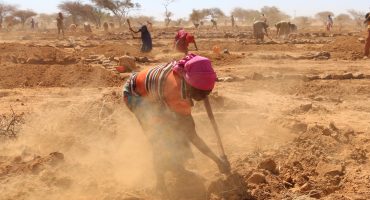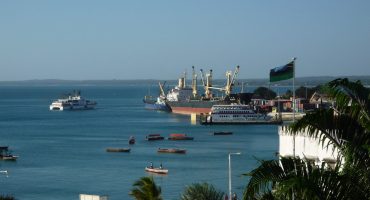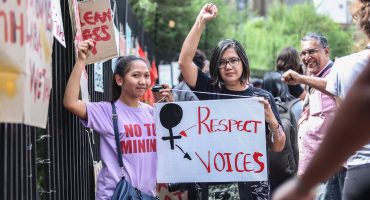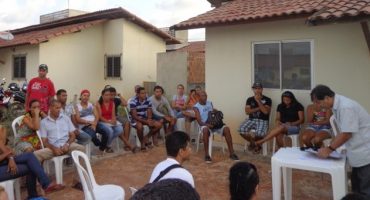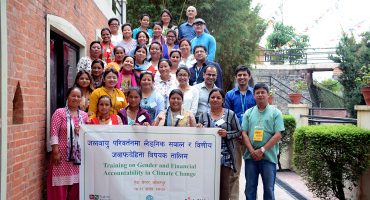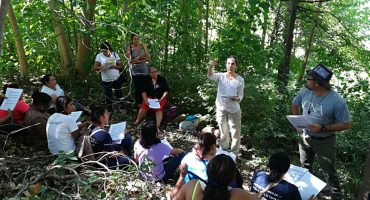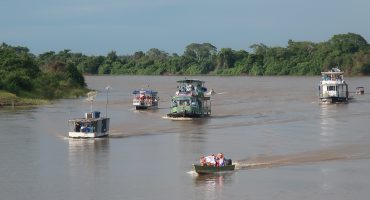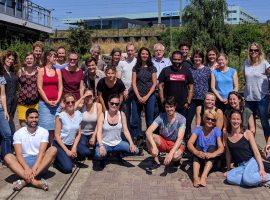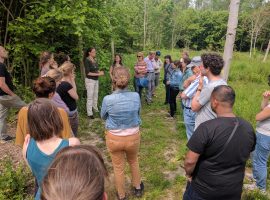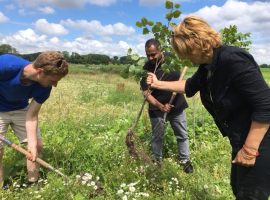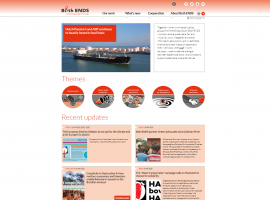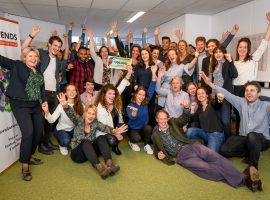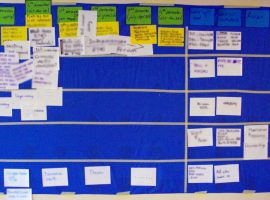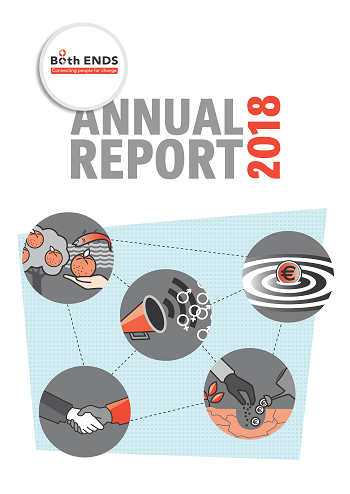A Word from the Board and our Director
CHANGE
It is a bit of a paradox, but if there is one lesson we’ve learned over the years it is that change is the most consistent thing we face. Both ENDS can never stand still. In an ever-changing global context, Both ENDS is both conscious of and alert to opportunities as they arise.
Our efforts to bring the DivestInvest campaign to the Netherlands is a good example. We saw the opportunity and took the initiative to connect and raise awareness among influential private investors who share our commitment to stopping climate change. We are in conversation with wealthy individuals to inspire them to shift their capital away from fossil fuels and into sustainable investments in energy, agriculture and urban development. This second step – investment – is crucial. Both ENDS is committed not only to pointing out what needs to stop, but also presenting alternative ways forward – everything from better ways of investing to more sustainable land and water use based on inclusive and democratic decision-making.
2018 marked the third year of our participation in the Global Alliance for Green and Gender Action. Thanks to our experience in GAGGA and the lessons learned from this program, Both ENDS can now say that our commitment to women’s rights – part of our founding principles – has been soundly integrated into everything we do. We now recognise ourselves as an environmental organisation that includes gender justice in all its work. This recognition is also reflected in our work with others. In 2018, for example, we were asked by the Dutch government to collaborate in learning events or provide policy input on issues related to gender and trade, gender and land rights, and gender and water. Our commitment to interweaving environmental justice with women’s rights can be seen throughout the stories that follow in this annual report.
Among the many changes we are aware of and responding to is increased repression. Although human rights were never fully respected by governments around the world, they are no longer even a professed ideal. Many of our partners are dealing with dangerous and precarious political situations. They are often risking their lives to do their work or working hard just to stay safe. In response, Both ENDS is expanding its network of allies who can act in solidarity and speak out on behalf of those who cannot safely speak themselves.
In this context, we will also continue to influence the agendas of institutional donors and environmental funders. We have stepped up our advocacy towards key donors, drawing their attention to the critical importance of supporting global networks that advocate for system change, and of supporting and funding formal and informal civil society groups that work under increasingly difficult circumstances on issues that are politically contentious and challenge economic powers.
The recognition that change is a constant process applies to the world around us and to Both ENDS itself. In 2018 we consolidated a reorganisation process leading towards a less hierarchical organisational structure inspired by self-management. The new structure gives Both ENDS staff members ample space for creativity and learning, and enables them to manage their own work and make the most of their individual expertise. The new structure is very well-suited to our knowledge-driven organisation. As part of the reorganisation process, the Board had the pleasure to meet with individual staff members, many of them relatively young or new to Both ENDS. Their commitment to their work and to Both ENDS is truly inspiring. Their enthusiasm for the new structure confirms that we are headed in the right direction.
The Board itself has also undergone a healthy change process which began with an evaluation in 2017 and a renewed vision of its role in the Both ENDS governance structure.
The Board confirmed that it primarily plays a supervisory role, while acting as a sparring partner in strategic processes. In addition, individual Board members may at times be asked to play an advisory role in their specific area of expertise. With this new profile in mind, several new Board members were recruited and have now joined the Board. We have already benefitted from the fresh perspective of new members. One unexpected benefit of having some new members with a professional background outside the field of international cooperation is that they bring to the table a strong conviction that Both ENDS should continue to work towards the realisation of high global standards of human rights, equality and inclusive governance – standards that we enjoy and have come to expect in the Netherlands.
THE FUTURE OF BOTH ENDS
Accepting and embracing the reality of continuous change means that we are constantly thinking ahead. At the end of the year, we initiated the process to develop our new five-year strategic plan by talking to a wide variety of stakeholders. Among other things, we learned that Both ENDS is valued for its expertise on issues that are at the centre of the public debate right now, including climate change, human rights and the economic system. We were also pleased to hear that Both ENDS is highly respected by policymakers in The Hague for taking positions that are based on evidence from a wide variety of sources and for making connections across countries and continents, from one part of the globe to the other.
We know that our strong relationships with and responsiveness to locally rooted partners is what makes the work we do both valued and effective. The next step in the strategy development process will be in-depth discussions with our partners about their contexts and priorities. Based on what they tell us, we will make the strategic choices – and changes – needed to maintain our effectiveness.
After all, change is constant.
Danielle Hirsch, Director
Paul Engel, Chair of the Board
Our vision, mission and strategy
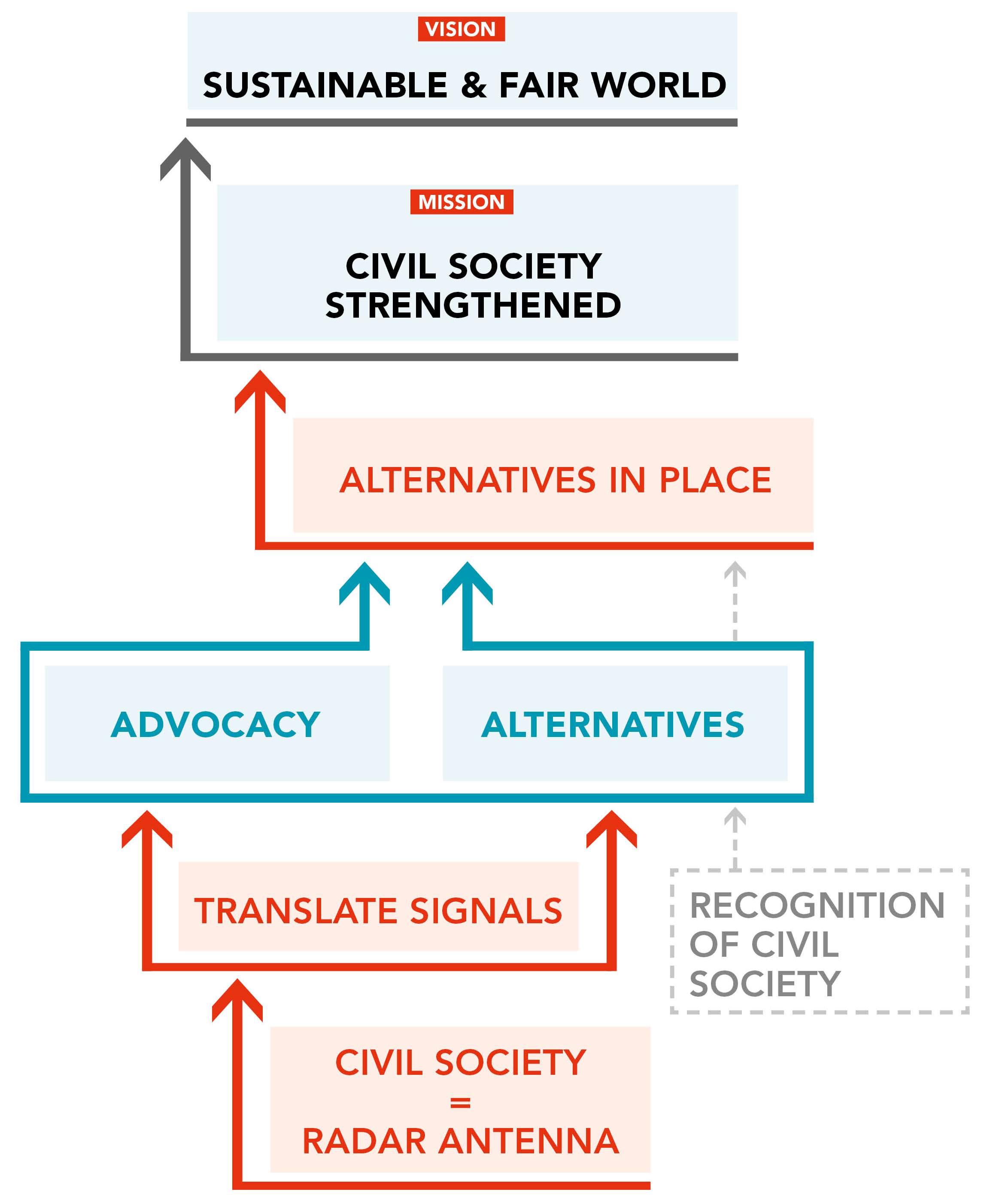 The vision of Both ENDS is a world where long-term environmental sustainability and social equity take priority over short-term profits.
The vision of Both ENDS is a world where long-term environmental sustainability and social equity take priority over short-term profits.
In order to make our vision reality, Both ENDS strengthens global civil society to gain decisive influence on the use of nature and the environment, thus contributing to societies that stay within our planetary boundaries and respect all human rights, including the rights to water, food and a safe living environment.
Civil society actors should have a free, independent, active and influential voice about the use of the natural resources that determine the quality of their daily lives and the future of their children. Respecting the planetary boundaries is a precondition for sustainable development. We should minimalise climate change, loss of biodiversity, pollution and ozone depletion, and use land and water in a responsible way, in order to keep our planet livable. At the same time, sustainable societies should respect all human rights. Not only the rights to water, food and a safe living environment, but also gender equity, indigenous rights and space for civil society.
HOW DO WE ACHIEVE THIS?
For Both ENDS, civil society in the Global South is at the starting point of everything we do. Our global network of environmental organisations, activists, community-based organisations, regional funds and researchers, who continuously signal threats to sustainable development, fulfils the role of our radar antenna.
Civil society actors are also in the best position to offer alternatives to these threats. All over the world, people are engaged in initiatives that prove how economic interests can go hand-in-hand with respect for nature and people’s wellbeing. These initiatives – many of them still small and scattered – present great hope for the realisation of sustainable and equitable economic systems, both locally and globally.
Together with our civil society partners, Both ENDS translates the signals of harmful policies and investments into advocacy and alternatives in favour of sustainable development. Essential for both successful advocacy processes and promotion of alternatives, is the recognition of civil society as an important key player.
ORGANISING ADVOCACY
Based on experiences on the ground, civil society exposes negative impacts of investment, trade and a wide range of policy decisions and instruments. We elevate these concrete experiences to advocate for policies and decision-making processes that implement basic principles of sustainable and inclusive development, focusing on implementation and enforcement.
To do so, civil society needs to have an entrance with decision makers and civil society players need to have sufficient organisational capacity to effectively raise their voice. Sufficient funding is another important precondition for an effective civil society.
Both ENDS closely works with its civil society partners to support each other in our collective aim for increased civic space. We do this, amongst other things, by developing advocacy strategies and performing advocacy and by exchanging knowledge and experiences. Our advocacy not only targets decision makers of public entities, but also public, semi-public and private investors operating at the local, regional or international level.
OFFERING ALTERNATIVES
Next to advocating against harmful developments, it is also of great importance to offer alternatives that support the transition towards sustainable and equitable societies. These alternatives can take the form of policies, laws, practices and governance models and often start as small-scale, local initiatives.
Together with civil society actors, Both ENDS identifies and/or develops these alternative policies, laws, practices and governance models for a sustainable use and governance of forest, water and land, with respect for human rights. We promote these alternatives to have them scaled up and disseminated by a broad group of stakeholders. Finally we want to see key decision makers and investors act upon these alternatives, and have them implemented and enforced.
In the end, by following the combined courses of advocacy (including capacity development) and promotion of alternatives, those policies, legal frameworks and practices that guarantee sustainable development and social equity will be in place and have an impact through implementation, enforcement and sustainable investments.
Our stories in 2018
In 2018, we worked closely with our partners around the world to achieve more sustainable and inclusive societies. Our joint projects and activities vary from regreening drylands to protecting wetlands, from capacity development at the community level to advocacy at United Nations level, from policy to practice. Below, we listed those stories from 2018 that really have to be told.
Read our stories from 2018:
Communities regreen the Sahel
There is no changing the fact that the Sahel is very hot, very sunny and very dry. But even as […]
Read More ›Connecting groups in East Africa for #TheInvestmentIWant
International trade and investment agreements set the conditions of international investment flows. Although they may make for dull reading, their […]
Read More ›Women say "no" to mining
Mining often has a huge and devastating impact on the environment, including water, air and forests. It can profoundly affect […]
Read More ›Export credit agencies’ role in development finance
Few people in the coastal fishing communities of northeastern Brazil may know what an export credit agency (ECA) is, but […]
Read More ›Local access to climate finance
Around the globe, civil society organisations are engaged in local initiatives to help people and environments adapt to climate shocks […]
Read More ›Women’s leadership in restoring ecosystems through analog forestry
When it comes to tending the land and securing vitally important income from it, women often play a leading role […]
Read More ›Wetlands without borders: the La Plata Basin
The La Plata Basin is the largest freshwater wetland in the world, extending into Argentina, Bolivia, Brazil, Paraguay and Uruguay. […]
Read More ›All projects in 2018
Take a look at the overview of all of our projects in 2018, including funders and project partners. Both ENDS […]
Read More ›About Both ENDS

